Hundreds of delegates from various industries convened at Duke Kunshan University’s campus for the Duke International Forum 2017 held on April 7. The topic for the day’s discussions – Spurring Investment into China’s Green Economy – attracted business leaders, academics and policy makers to explore this new area of fiscal opportunity, where China is leading the world in innovative thinking.
The one-day forum was jointly organized by Duke Kunshan University, Duke University’s Fuqua School of Business, Sanford School of Public Policy, and Nicholas School of the Environment, with support from Kunshan as strategic supporting partner and Bank of Jiangsu and Bank of Suzhou as contributing partners.
Following a signing ceremony, where local government and business officials pledged strategic cooperation on green issues, the program of highly informative speeches began.

Zhang Junjie,
Director, Environmental Research Center, Duke Kunshan University
Li Yaping, acting mayor of Suzhou, Jiangsu province, said the concept of green development has been widely accepted in China and green finance, as a new type of financing, is becoming an important contributor to green growth and sustainable development.

Li Yaping,
Deputy Secretary of the Municipal Party Committee of Suzhou;
Acting Mayor of Suzhou
‘I hope Duke Kunshan University could strengthen the cultivation of talents and provide strong intellectual, technology and talent support for the development of Suzhou’s green finance industry,’ he said.
XIE Zhenhua, a Special Representative on Climate Change and vice-chairman of the National Committee of Population, Resources and Environment of the Chinese People’s Political Consultative Conference, called for China to lead the world in establishing an international carbon trading market.

Xie Zhenhua,
Special Representative on Climate Change;
Deputy Director of CPPCC;
Formal Vice Chairman of NDRC
‘Green philosophy is now penetrating every industry, and is a concern not just for business leaders, but political leaders as well,’ he said. ‘China is set to outperform on its commitment to reducing our country’s carbon footprint, and it is important that we stay on track.’

Green Finance Initiative Opening Ceremony
The first keynote speech was delivered by Chief Economist at the Research Bureau of the People’s Bank of China MA Jun. He spoke about one of the most visible and obvious legacies of China’s rapid industrialization in the last three decades ‘ air pollution.

Ma Jun,
Chief Economist, Research Bureau, The People’s Bank of China
He said that in 2013, China lost 3.8% of GDP because of the negative effects of air pollution on the environment and people’s health. He also called upon the private sector to do their part in investing in green industries, and said that the burden of sustainability cannot fall on the government alone.
In order to do this, he said there must be ‘attractive enhancement on investment returns in green industries’ and there should be ‘reduced incentives for investing in products and companies that create a negative environmental impact.’
The government can take more action through legislation, said the next keynote speaker GAO Xiqing, Professor of Law at Tsinghua University and former General Manager of China Investment Corporation.
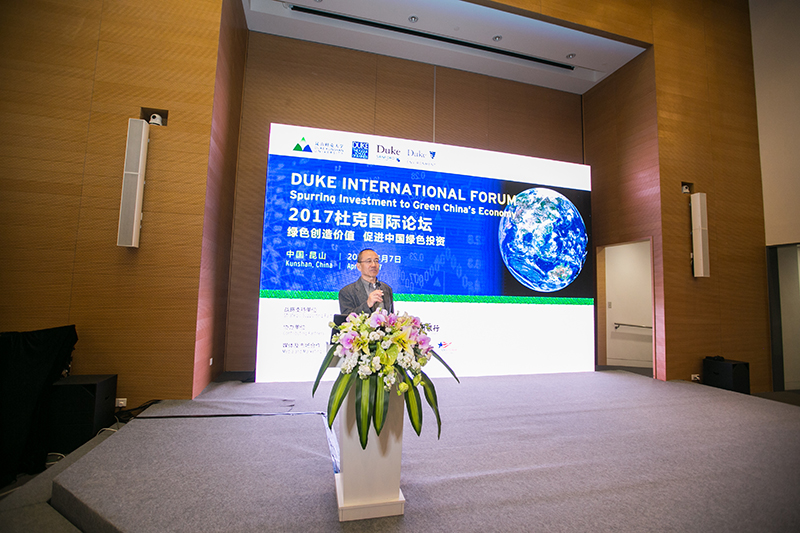
Gao Xiqing,
Professor,School of Law,Tsinghua University;
Former Vice Chairman and President, China Investment Corporation
‘The legal system can provide a solid foundation for positive environmental change,’ he said. ‘The pollution is out there. You can see it; we all acknowledge it and cannot ignore it anymore. It is the responsibility of both the business and government sector to try and tackle this, which means the state then takes a natural role in making laws.’
The next speaker focused on how specialist business areas can make their contribution to environmental change. SHENG Hetai, Vice President of the People’s Insurance Company of China Limited, proposed implementing insurance mechanisms to make high polluting companies less competitive, thus forcing them to be more innovative in their drive to improve and perform.
‘Heavy industry accounts for 30% of China’s GDP, but the cost of pollution is bourn by society as a whole. We must therefore also ask large companies to share the responsibility, and help shoulder some of the cost along with the government,’ he said.
Mr. Sheng added that insurance schemes to encourage sustainable behavior could be passed onto consumers, citing an example of incentivizing people to car share by offering attractive insurance premiums.

Sheng Hetai,
Vice President, the People’s Insurance Company of China Limited
Following a lunch break where delegates had the chance to network, enjoy good food and take in the surroundings at Duke Kunshan University, the afternoon session saw more keynote speeches and four concurrent plenary panel discussions.

Plenary Panel Discussion: Development and Practice of Green Banking in China
The first of these, on the topic of the Development and Practice of Green Banking in China, saw senior industry executives and industry innovators exchange views as well as share best practices with their learning and experience with attendees.
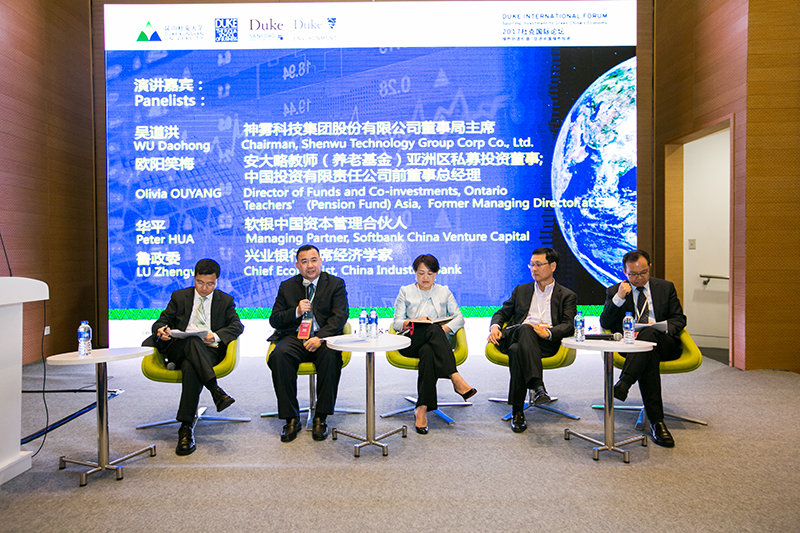
Panel #1: Attracting Financing for Sustainability Enhancing Investments
Three other discussions also took place on the topics of:
- Attracting Financing for Sustainability Enhancing Investments
- Financing Green Innovation and Startups
- Using Carbon Markets to Mobilize Low-Carbon Investment
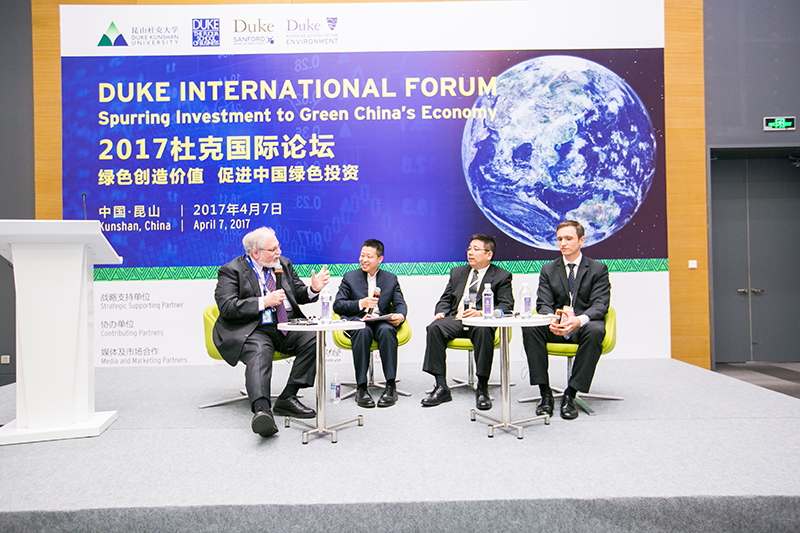
Panel #2 : Financing Green Innovation and Startups

Panel #3 : Using Carbon Markets to Mobilize Low-Carbon Investment
The final hours of the afternoon saw the last speakers share their experiences in the field of Green Finance.
ZHANG Xinsheng, Chairman of Knicks Capital Limited and Chairman of the Forever Nature Capital Foundation, spoke about food provenance, and gave a specific example about rearing sheep in Inner Mongolia. He spoke about how sustainable practices, backed by green finance, gave farmers higher yields while at the same time improved the safety of the food chain.
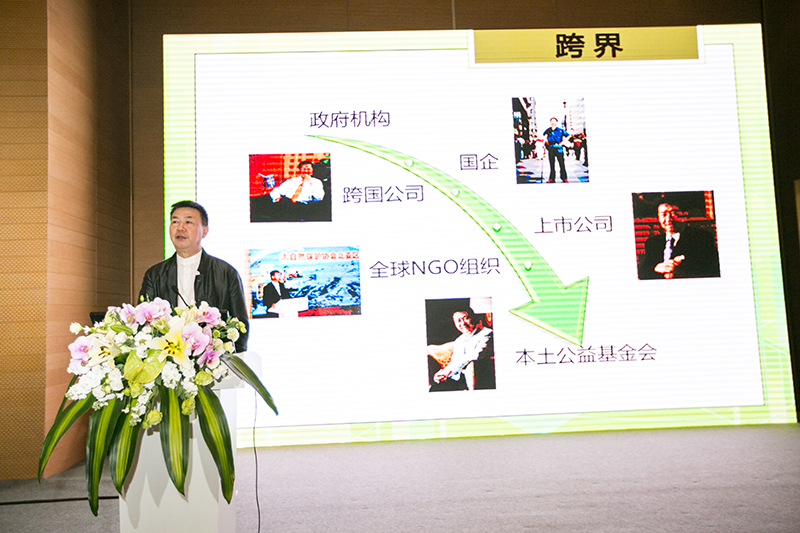
Zhang Xingsheng,
Chairman of Knicks Capital Ltd.;
Chairman of The Forever Nature Capital Foundation
‘There are many environmental impacts, particularly in agriculture and food production, that people don’t see or aren’t aware of, but if we make incentives for farmers and producers to be green, then we all benefit from better quality as well as a safer end product,’ Zhang said.
‘Educating people about the benefits of a better environment will get more support at a consumer level for green practices in businesses, and the businesses will have to react to this.’
LIU Mingkang, Deputy Director of the CPPCC, was the final speaker to take to the podium who also summed up some of his key learning from the day.
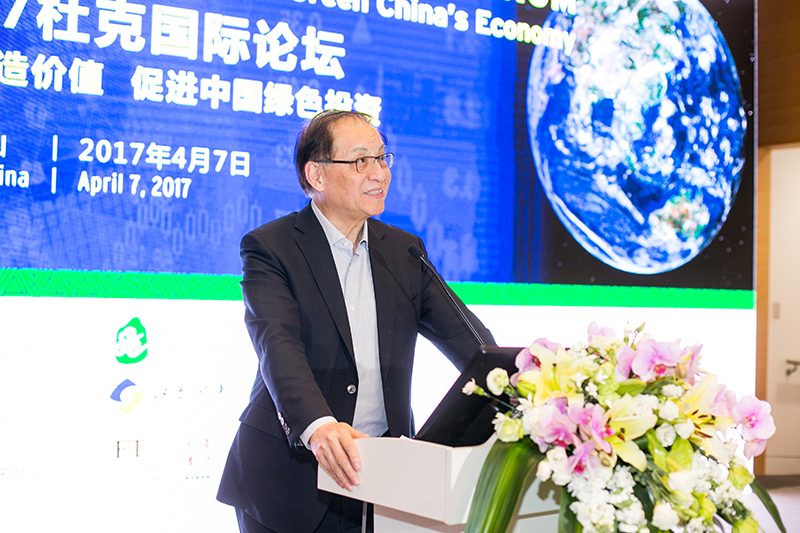
Liu Mingkang,
Deputy Director, Committee for Economic Affairs of CPPCC;
Former Chairman of China Banking Regulatory Commission (CBRC)
‘Environmental protection is a key topic nowadays, and we now also know that it is a driving force behind economic growth that creates more jobs.’ said Liu.
‘The biggest takeaway for me is we have to take what we have learned in this room and share it, and then we will be able to enhance awareness of the opportunities of green finance.’
At the end of the day, as more than 300 attendees left the campus to consider how they can embrace the opportunities of the green economy in their organizations, Denis Simon, Executive Vice Chancellor of Duke Kunshan University, reflected on the event.
‘Duke Kunshan University saw the forum as a way to establish itself as a key player in the field of environmental policy and management here in China,’ he said. ‘Green finance is undoubtedly a developing area and one that will bring about change, influence economic opportunities and drive innovation across the world.’
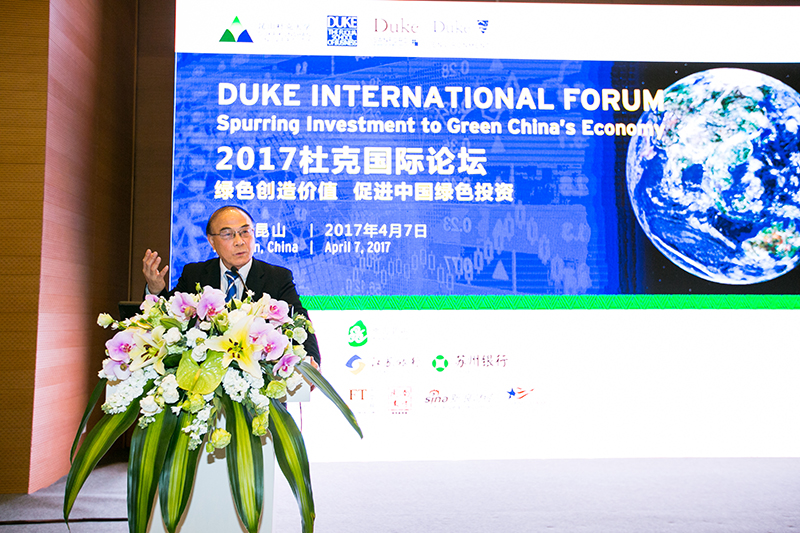
Liu Jingnan,
Chancellor of Duke Kunshan University
‘There have been many interesting issues raised and discussed here today, and I want to thank all of those who have contributed to making it a success,’ Simon added. ‘It is events like the Duke International Forum that helps to establish Duke Kunshan University as a thought leader in addressing some of the most pressing global problems of our age.
2017 Duke International Forum Organizers & Partners
Organizers:
- Duke Kunshan University
- The Fuqua School of Business
- Sanford School of Public Policy
- Nicholas School of The Environment
Strategic Supporting Partner:
- Kunshan Municipal Government
Contributing Partners:
- Bank of Jiangsu
- Bank of Suzhou
Media & Marketing Partners:
- Financial Times (Chinese Web)
- Southern Weekly
- Sina Finance
- AmCham Shanghai

